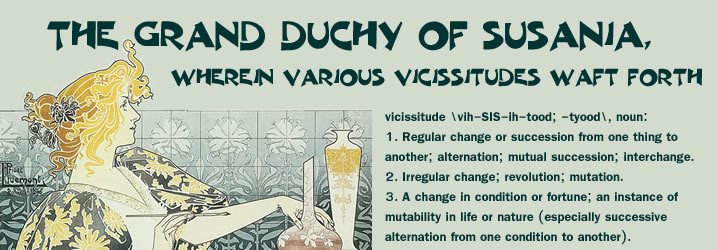Why do I envision time at different geometric points? Probably due to
subconscious memories of elementary school bulletin board displays, or
textbook timeline charts. Some "chunks" of time are set apart with a
greater focus on individual years, while others are a long line with
nothing to distinguish them.
This is going to take some drawing, and I'm a lousy artist. Bear with
me. I also don't want to mark specific events on the line, as it will
become an exercise in "looking things up" that I remember imperfectly.
The B.C. years emerge from a misty patch to my right - they go back
endlessly past some invisible horizon, but from about the time of Moses
is when I can see the beginning of the line. They go in a straight line
to the left, until 60 BC, when they break left and go straight down
until the BC/AD turnover, where they resume their journey to the left.
Upon reaching AD 30-ish, the line turns right and goes straight up
through 300 AD, when it breaks left again and continues on in an
unbroken line until the Renaissance.

In the year 1400, time begins to fold back and forth upon itself; still
continuing from right to left, but starting in the year 01, going
straight up to the year 00, and then turning left and skipping back to
the starting point of 01, to repeat the upward journey until the year
1800.

In 1800 time takes the left turn, but instead of skipping back down to
the 01 starting point, it takes a hairpin turn and time starts running
the other direction, from top to bottom. At 1900, time turns right, and
skips back up to the "top of the page" and starts running downwards.
Only now the line becomes thicker, and as you follow it along, the
individual years stand out, and each one has an actual visual
significance. It's like zooming in on a DNA strand, and starting to see
the details of each individual dot. You realize that each year within
the line is actually an oval, which loops from top left down until
June-July, and then loops back up on the right to make the oval. Look
closer, and each month is, of course, a calendar page, a square grid
strung one after the other like beads on a necklace.

Upon reaching 2000, the line becomes less certain - you can't quite
figure out which direction it is going, or plans to go. Currently, it is
still continuing on from right to left, but it has made no turns - it
is the same unbent line since 1900. I suppose that because this is the
part of the line that I am personally living in, I can't make it bend
any direction other than the inevitable drive to the West/Left. Give me a
few more years and maybe I will be able to see if it will bend.
I suppose psychological gender studies that look into this sort of
thing might make much of the fact that individual years are circular
(feminine), while the direction of centuries is in straight lines
(masculine). Maybe because women instinctively count the months for
their menstrual cycle, or the cycle of yearly rebirth and death is more
apparent to women; and the straight lines of history are more about time
as visualized by the men who made most of it. I have a healthy
curiosity of gender differences, but ultimately all I can say is that my
visualization of time has been the slow development of education,
books, culture and my perception of the years I have actually inhabited
time.
Now... it's your turn! How do you see time? I'd love to hear about it.

